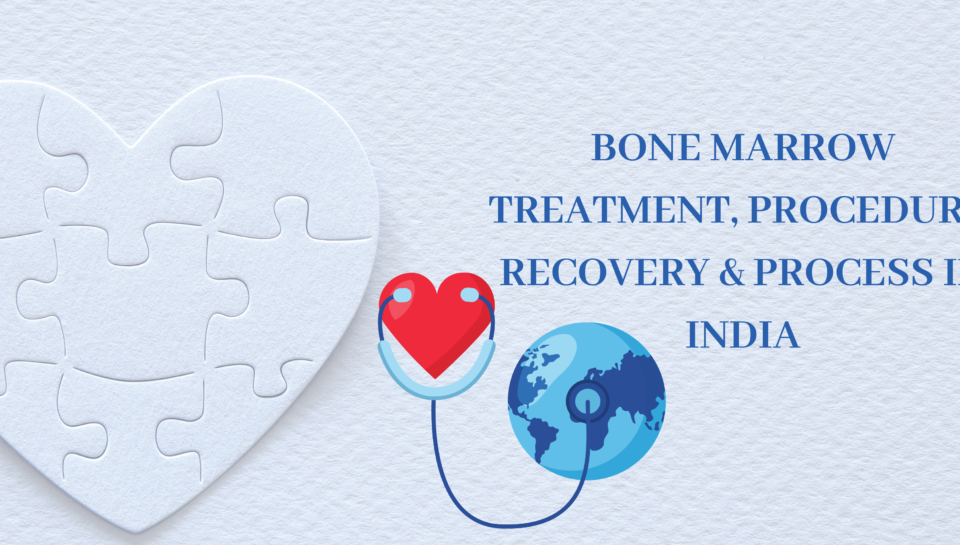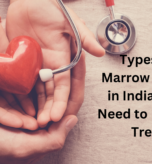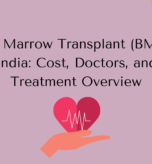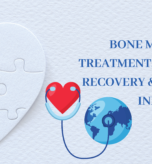Bone marrow transplant (BMT), also known as hematopoietic stem cell transplantation (HSCT), is a life-saving medical procedure that treats various types of cancers and blood disorders. These conditions can severely affect the bone marrow, the soft tissue inside bones responsible for producing blood cells. The procedure involves replacing the damaged or diseased bone marrow with healthy stem cells from a donor or the patient’s own body. India has become one of the leading destinations for bone marrow transplants due to its highly skilled medical professionals, advanced healthcare infrastructure, and affordable treatment options.
What is Bone Marrow Treatment?
Bone marrow is a spongy tissue found inside the bones that produces the blood cells required for the body to function properly. It produces red blood cells (which carry oxygen), white blood cells (which fight infections), and platelets (which help in clotting). When the bone marrow is unable to produce sufficient healthy blood cells due to disease or damage, it may require treatment like a bone marrow transplant.
Bone marrow treatment (BMT) involves transplanting healthy stem cells into the bone marrow to restore its ability to produce healthy blood cells. This procedure is most often recommended for patients with:
- Leukemia
- Lymphoma
- Multiple myeloma
- Aplastic anemia
- Severe sickle cell disease
- Thalassemia
- Other immune system disorders
There are two main types of bone marrow transplants: Autologous (using the patient’s own stem cells) and Allogeneic (using stem cells from a compatible donor).
Bone Marrow Transplant Procedure in India
India has become a preferred destination for patients requiring bone marrow transplants due to the high-quality treatment available at affordable prices. The BMT procedure generally involves the following steps:
1. Pre-Transplant Evaluation and Preparation
Before the procedure, the patient undergoes thorough tests, including blood tests, imaging scans, and bone marrow biopsies, to determine their eligibility for a bone marrow transplant. The patient’s overall health, the condition of the bone marrow, and the type of disease or disorder are assessed. The doctor may also perform genetic testing to find the best match for a bone marrow donor (in case of an allogeneic transplant).
The patient may be required to undergo chemotherapy or radiation therapy to destroy the unhealthy bone marrow and create space for the new, healthy stem cells to grow. This process is known as conditioning therapy, and it is essential for the success of the transplant.
2. Harvesting the Stem Cells
For autologous transplants, the patient’s own stem cells are collected before the chemotherapy or radiation treatment. The process of collecting stem cells is called apheresis. Blood is drawn from the patient, and stem cells are separated using a machine, then stored for later use.
In allogeneic transplants, stem cells are harvested from a healthy, compatible donor. Donor stem cells can be collected from bone marrow (harvested under anesthesia) or from peripheral blood through a process similar to apheresis. In some cases, umbilical cord blood may also be used as a source of stem cells.
3. Transplantation
Once the patient’s or donor’s stem cells are collected and processed, the stem cells are infused into the patient’s bloodstream through an intravenous (IV) drip. The transplant itself is similar to a blood transfusion and typically lasts a few hours.
After the transplant, the patient remains under close observation in the hospital to ensure there are no complications. The stem cells travel to the bone marrow, where they begin to produce new blood cells. This process takes time, often several weeks, during which the patient is monitored for signs of engraftment, where the transplanted stem cells begin to grow and produce healthy blood cells.
4. Post-Transplant Care
After the bone marrow transplant in India, the patient is carefully monitored for signs of recovery. During this phase, the patient may be susceptible to infections due to the suppressed immune system caused by the chemotherapy or radiation treatment. The medical team will take steps to prevent and treat infections, manage symptoms, and help the patient recover.
The patient may be required to stay in the hospital for several weeks or even months after the transplant, depending on their condition. Once the new bone marrow begins functioning and blood counts improve, the patient will gradually be allowed to leave the hospital, although regular follow-up visits to the hospital are necessary.
Bone Marrow Transplant Recovery Process
The recovery process following a bone marrow transplant can be lengthy and challenging, but the outcome can be life-changing. The recovery period generally takes months and involves several stages:
- Engraftment: This is the process in which the transplanted stem cells begin producing healthy blood cells. This phase typically occurs 2-4 weeks after the transplant, but it can take longer in some cases.
- Immune System Recovery: The patient’s immune system is weakened after the transplant due to conditioning therapy, so it may take months for the immune system to fully recover. During this time, patients are at higher risk of infections.
- Post-Transplant Complications: There are risks of complications such as graft-versus-host disease (in allogeneic transplants), where the donor cells attack the recipient’s tissues, or relapse of the original disease. Medications and treatments may be required to manage these complications.
- Follow-Up Appointments: Regular follow-up visits to the doctor are essential to monitor the patient’s progress. Blood tests and imaging are conducted to check the functioning of the new bone marrow and ensure there are no signs of disease relapse.
- Long-Term Monitoring: The patient will be monitored for months or even years after the transplant to assess the long-term success of the treatment and check for any late-onset complications.
Why Choose India for Bone Marrow Treatment?
India is a leading destination for bone marrow transplants, offering several key benefits:
- Affordable Treatment: The cost of bone marrow transplants in India is significantly lower compared to Western countries, making it a cost-effective option for international patients.
- World-Class Hospitals: India is home to some of the world’s best hospitals specializing in bone marrow transplants, equipped with state-of-the-art facilities and advanced medical technology.
- Experienced Doctors: Indian oncologists and hematologists are well-trained and experienced in performing complex bone marrow transplants, having performed thousands of successful procedures.
- Patient-Centered Care: Hospitals in India offer personalized care tailored to the unique needs of each patient, ensuring the best possible outcome.
Conclusion
Bone marrow transplants offer a life-saving treatment option for those suffering from various cancers and blood disorders. With world-class medical facilities, skilled doctors, and affordable treatment options, India has become a leading destination for bone marrow transplantation. By choosing India for BMT, you gain access to cutting-edge medical care and a high success rate, all while benefiting from the lower cost of treatment compared to Western countries. If you are considering bone marrow treatment, India and Medserg can help guide you through the process, ensuring a smooth and successful journey toward recovery.



